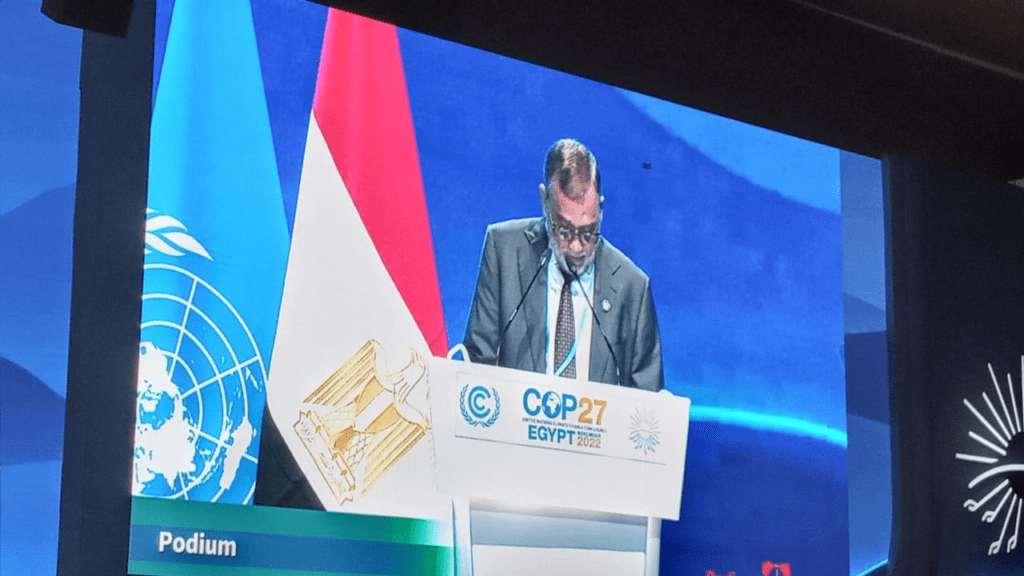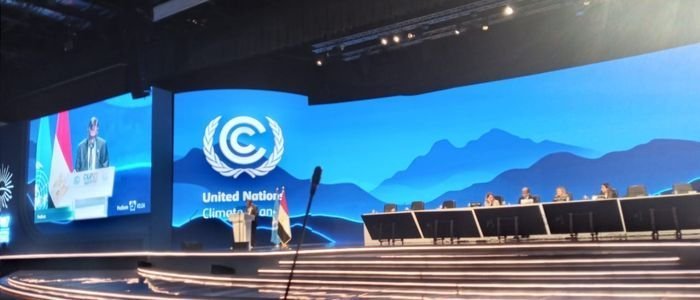Photo: The Metropolis
Metropolis Special –
Bangladesh made the national statement at the 27th Session of the Conference of the Parties (COP27) today afternoon (15th November 2022) in presence of the world leaders and delegates in Sharm-El Sheikh, Egypt.
Md. Shahab Uddin MP, Honorable Minister of Environment, Forest, and Climate Change, addressed the distinguished attendees by mentioning that contributing less than 0.48 percent of global emissions, Bangladesh is an innocent victim of climate change with 12 to 17 percent of the country, an area larger than many small island countries, will be submerged by this century due to Sea Level Rise.
Honorable Minister Md. Shahab Uddin also mentioned that Bangladesh strives for shifting the country’s vulnerability towards resilience with a national climate finance mechanism, “Bangladesh Climate Change Trust Fund” from its resources and allocated 490 million US dollars that supports more than 850 projects for making the country’s climate resilient.
He also mentioned that the climate-relevant allocation in our Annual Development Plan has increased by two and a half times over the last eight years from 1.4 billion to more than 3.1 billion US dollars for climate adaptation and resilience-building through the construction of sea dykes, cyclone shelters, development of stress-tolerant varieties and coastal afforestation and reforestation.
He continued, “As the Chair of the CVF (Climate Vulnerable Forum) till March 2022, Bangladesh played a leadership role in bridging the gap between developed and developing countries under the leadership of our Hon’ble Prime Minister Sheikh Hasina. During our tenure, we prepared Climate Prosperity Plan to enhance our resilience and promote mitigation actions in CVF member countries.”
“Currently, we are implementing the world’s biggest housing project for climate refugees in Cox’s Bazar to construct 139-multi-story buildings with all facilities to shelter 4,400 climate refugee families.”
“Under the Ashrayan project, a landmark initiative of my government for the landless and homeless people including climate change-induced displaced, a total of 4 lac and 42 thousand families have been given houses.”

On 31st October 2022, Bangladesh submitted the National Adaptation Plan (NAP) to UNFCCC (United Nations Framework Convention on Climate Change). In this, Bangladesh has identified 113 actions for 8 vulnerable sectors. 230 billion US dollars will be required to implement these actions during the next 27 years (2023-2050).
Mentioning these facts, Md. Shahab Uddin asked for dedicated, additional financial resources for the effective implementation of adaptation actions identified in the National Adaptation Plan.
The honorable Minister urged that the countries that are most responsible for greenhouse gas emissions should share responsibility for protecting the people vulnerable to the impacts of climate change. He demanded that the developed countries keep their commitments providing 100 billion US dollars each year, the major portion of which should come from a public fund dedicated to climate change adaptation.
“Despite being one of the least emitters in the world and even with our limited resources, Bangladesh is pursuing a low carbon development path with increasing emphasis on renewable energy, energy efficiency, and energy conservation.”
“We have installed more than 6.5 million solar home systems in off-grid areas of the country ensuring the supply of solar electricity to 18 million people. Now we are giving more focus on grid-connected solar parks, rooftop solar facilities, and solar irrigation systems.”
Md. Shahab Uddin mentioned that we updated our NDC (Nationally Determined Contribution) last year, increasing the emission reduction contributions by around three times compared to the 2015 INDC (Intended Nationally Determined Contribution).
Recently published new multi-agency report shows that we are heading in the wrong direction; atmospheric greenhouse gas concentrations continue to rise to record highs, and the ambition of emissions reduction pledges for 2030 needs to be seven times higher to be in line with the 1.5-degree Celsius goal of the Paris Agreement.
The honorable Minister told that at this COP27, it’s essential that we make progress in the following areas:
-
Addressing the gap that exists between NDCs and emission reductions required by the science to keep the 1.5-degree Celsius target alive, including finalizing the mitigation work program as necessary to reduce global carbon emission by 45 percent by 2030;
-
Ensuring the mobilization and providing 100 billion US dollars each year from this year to 2025, finalizing the definition of climate finance and achieving substantial progress on New Collective Quantified Goal (NCQG) on climate finance for post-2025;
-
Requesting the developed countries to at least double their collective provision of adaptation finance by 2025 as agreed during COP 26 in Glasgow, and providing support for the implementation of the National Adaptation Plan;
-
Establishment of a financing mechanism for averting, minimizing, and addressing loss and damage.
Finally, the honorable Minister Md. Shahab Uddin urged global leaders to implement the decisions of the Paris Agreement and provisions of the Glasgow Climate Pacts to fight against the extreme threats of Climate Change and make the world a safer and better place for our future generation.



